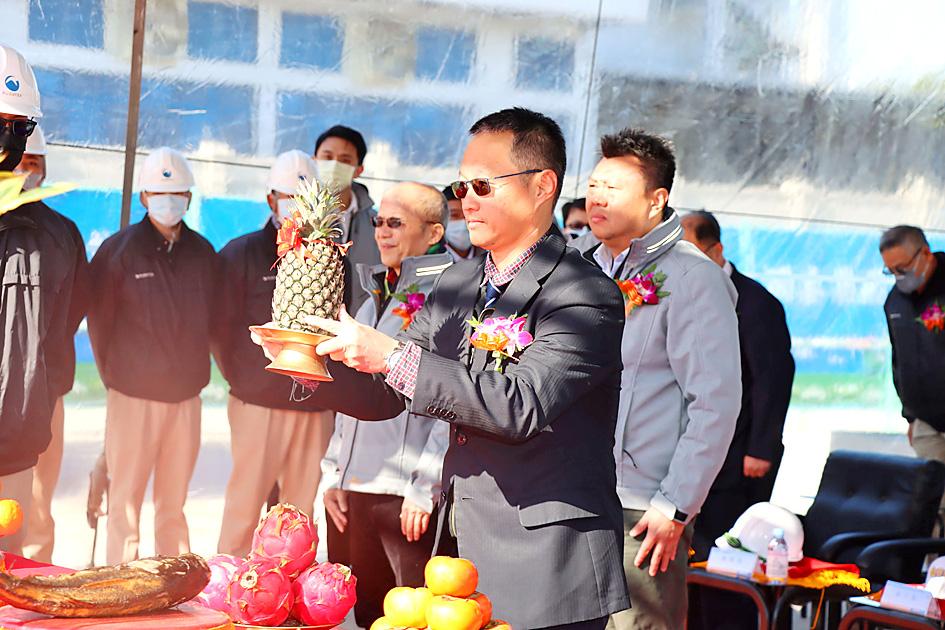NAND flash memory controller supplier Phison Electronics Corp (群聯電子) on Saturday held a beam-raising ceremony for its new phase-five facility in the Guangyuan Science Park (廣源科學園區) in Miaoli County’s Jhunan Township (竹南).
Phison plans to finish the nearly NT$1.4 billion (US$49.2 million) plant in the third quarter and begin operations by the end of September, the Chinese-language Web site cnYES.com reported on Saturday.
The facility is expected to increase space by more than 13,000 ping (42,975m2), which would be mainly used for research and development (R&D) and inventory management for 5G related products, cnYES reported.

Photo courtesy of the Miaoli County Government
Phison said it plans to recruit 1,500 to 2,000 R&D engineers to work in the facility, and would continue hiring over the next two years to maintain its leadership in NAND flash controllers.
Phison mainly designs and manufactures NAND flash controller ICs and memory modules for solid-state drives (SSD), embedded multimedia cards (eMMC), universal flash storage devices, universal serial buses and SD memory cards.
In the past few years, the company has diversified from focusing on consumer products to covering industrial, enterprise and automotive products.
Phison’s competitors in controllers are Marvell Technology Group Ltd and Silicon Motion Technology Corp (慧榮科技), as well as SanDisk Corp and Transcend Information Inc (創見資訊) in flash modules.
Due to price hikes upstream in the semiconductor supply chain, extending from printed circuit board suppliers, IC packagers and IC testers to foundry companies to component material makers, Phison has raised prices of NAND flash controller ICs by 15 to 20 percent since the fourth quarter of last year, cnYES reported, citing Phison chairman Pua Khein-seng (潘健成).
The company’s prices have risen by up to 50 percent for some customers due to strong demand, rising costs and capacity constraints, Pua said on the sidelines of the ceremony.
Phison on Friday reported revenue of NT$4.17 billion for last month, an increase of 1.94 percent year-on-year. Cumulative revenue for last year reached NT$48.5 billion, up 8.51 percent from the previous year to reach an annual record.
The COVID-19 pandemic has fundamentally changed people’s lives, driving demand for various applications due to the work-from-home trend, including cloud services, gaming, remote schooling and the notebook computer industry, Pau said in a statement.
These applications require NAND storage products, which helped drive Phison’s revenue to a new high last year, he said.
“Last year, total shipments of SSD and eMMC memory modules grew by nearly 25 percent, setting a new high for the same period,” the statement said, adding that shipments of PCIe SSD controllers also grew nearly 82 percent from a year earlier, while those of industrial controllers increased by 11 percent.
Pua said he remains positive on the company’s prospects this year, expecting revenue to climb further, with a higher profit than last year’s, given smooth production in the upstream supply chain, cnYES reported.
Founded in 2000, Phison sees growing opportunities in eMMC and PCIe generation-4 solutions, the company said, adding that it has expanded from 200 employees to more than 2,300.

Hon Hai Precision Industry Co (鴻海精密) yesterday said that its research institute has launched its first advanced artificial intelligence (AI) large language model (LLM) using traditional Chinese, with technology assistance from Nvidia Corp. Hon Hai, also known as Foxconn Technology Group (富士康科技集團), said the LLM, FoxBrain, is expected to improve its data analysis capabilities for smart manufacturing, and electric vehicle and smart city development. An LLM is a type of AI trained on vast amounts of text data and uses deep learning techniques, particularly neural networks, to process and generate language. They are essential for building and improving AI-powered servers. Nvidia provided assistance

GREAT SUCCESS: Republican Senator Todd Young expressed surprise at Trump’s comments and said he expects the administration to keep the program running US lawmakers who helped secure billions of dollars in subsidies for domestic semiconductor manufacturing rejected US President Donald Trump’s call to revoke the 2022 CHIPS and Science Act, signaling that any repeal effort in the US Congress would fall short. US Senate Minority Leader Chuck Schumer, who negotiated the law, on Wednesday said that Trump’s demand would fail, while a top Republican proponent, US Senator Todd Young, expressed surprise at the president’s comments and said he expects the administration to keep the program running. The CHIPS Act is “essential for America leading the world in tech, leading the world in AI [artificial

DOMESTIC SUPPLY: The probe comes as Donald Trump has called for the repeal of the US$52.7 billion CHIPS and Science Act, which the US Congress passed in 2022 The Office of the US Trade Representative is to hold a hearing tomorrow into older Chinese-made “legacy” semiconductors that could heap more US tariffs on chips from China that power everyday goods from cars to washing machines to telecoms equipment. The probe, which began during former US president Joe Biden’s tenure in December last year, aims to protect US and other semiconductor producers from China’s massive state-driven buildup of domestic chip supply. A 50 percent US tariff on Chinese semiconductors began on Jan. 1. Legacy chips use older manufacturing processes introduced more than a decade ago and are often far simpler than

Gasoline and diesel prices this week are to decrease NT$0.5 and NT$1 per liter respectively as international crude prices continued to fall last week, CPC Corp, Taiwan (CPC, 台灣中油) and Formosa Petrochemical Corp (台塑石化) said yesterday. Effective today, gasoline prices at CPC and Formosa stations are to decrease to NT$29.2, NT$30.7 and NT$32.7 per liter for 92, 95 and 98-octane unleaded gasoline respectively, while premium diesel is to cost NT$27.9 per liter at CPC stations and NT$27.7 at Formosa pumps, the companies said in separate statements. Global crude oil prices dropped last week after the eight OPEC+ members said they would